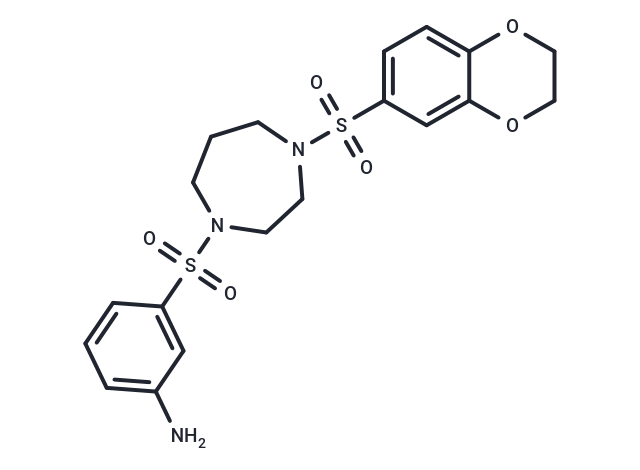Shopping Cart
Remove All Your shopping cart is currently empty
Your shopping cart is currently empty
DASA-58 is a specific and potent Pyruvate kinase M2 (PKM2) activator.

| Pack Size | Price | USA Warehouse | Global Warehouse | Quantity |
|---|---|---|---|---|
| 2 mg | $37 | In Stock | In Stock | |
| 5 mg | $64 | In Stock | In Stock | |
| 10 mg | $97 | In Stock | In Stock | |
| 25 mg | $198 | In Stock | In Stock | |
| 50 mg | $345 | In Stock | In Stock | |
| 100 mg | $547 | In Stock | In Stock | |
| 1 mL x 10 mM (in DMSO) | $70 | In Stock | In Stock |
| Description | DASA-58 is a specific and potent Pyruvate kinase M2 (PKM2) activator. |
| In vitro | DASA-58 inhibits LPS-induced Hif-1α and IL-1β, as well as the expression of a range of other Hif-1α-dependent genes in primary BMDMs, and also inhibits glycolysis and the accumulation of succinate in LPS-activated macrophages. [1] In PC3 cells, DASA-58 impairs stromal-induced EMT program by restoring PK activity and abrogating the nuclear translocation of PKM2, as well as its association with HIF-1α. DASA-58 also dramatically reduces (~6-fold) CAFs-induced lung metastases formation in PC3 cells. [2] |
| In vivo | DASA-58 (40 μM) affects EMT of prostate cancers and tumor dissemination in SCID mice. [2] |
| Kinase Assay | CDK kinase assay: Kinase assays are performed in 96-well polypropylene plates. Each reaction contained 2 μg of histone H1 at a final concentration of 10 μM [γ-33P]ATP (0.2 μCi/well; approximately twice the experimentally determined Km), 10 mM MgCl2, 1 mM DTT, 0.01% Triton X-100, and 10% glycerol in a 40 μL volume. The reaction is initiated with the addition of 20 μL enzyme (6 ng cdk2/well resulting in a final concentration of 1.6 nM), which is previously diluted 1:50–1:200 in the same buffer, and allowed to proceed for 1 h at room temperature. Reaction is stopped by the addition of 0.01 mL 10% phosphoric acid, and 25 μL of reaction mixture is transferred to P30 phosphocellulose filter mat paper. The filter mat is washed three times with 1.0% phosphoric acid, air dried, and then counted for radioactivity in a liquid scintillation counter. The cdk4 kinase assay for cyclin D1-cdk4 is carried out in a polypropylene 96-well microtiter plate format measuring the incorporation of radioactive phosphate into GST-Rb. Purified cyclin D1-cdk4 is incubated with 1 μg GST-Rb in 20 mM HEPES (pH 7.5) in the presence of 10 mM MgCl2, 1 mM DTT, 0.01% Triton X-100, and 10% glycerol. The final cdk4 concentration is 10 ng/well, or 1.6 nM. Kinase reaction is initiated by the addition of ATP at a final concentration of 10 μM ATP (twice the experimentally determined Km) and [γ-33P]ATP (1.0 μCi per well) in a 60-μL volume and allowed to proceed at room temperature for 1 h. Reaction is stopped by the addition of 0.01 ml 10% phosphoric acid, and 25 μL of reaction mixture is transferred to P30 phosphocellulose filter mat paper. The filter mat is treated as for Cdk1/Cdk2 assays. |
| Molecular Weight | 453.53 |
| Formula | C19H23N3O6S2 |
| Cas No. | 1203494-49-8 |
| Smiles | Nc1cccc(c1)S(=O)(=O)N1CCCN(CC1)S(=O)(=O)c1ccc2OCCOc2c1 |
| Relative Density. | 1.453 g/cm3 (Predicted) |
| Storage | In solvent: -80°C for 1 year | Shipping with blue ice/Shipping at ambient temperature. | |||||||||||||||||||||||||||||||||||
| Solubility Information | Ethanol: < 1 mg/mL (insoluble or slightly soluble) DMSO: 125.5 mg/mL (276.72 mM), Sonication is recommended. H2O: < 1 mg/mL (insoluble or slightly soluble) | |||||||||||||||||||||||||||||||||||
| In Vivo Formulation | 10% DMSO+40% PEG300+5% Tween 80+45% Saline: 3.3 mg/mL (7.28 mM), Sonication is recommended. Please add the solvents sequentially, clarifying the solution as much as possible before adding the next one. Dissolve by heating and/or sonication if necessary. Working solution is recommended to be prepared and used immediately. The formulation provided above is for reference purposes only. In vivo formulations may vary and should be modified based on specific experimental conditions. | |||||||||||||||||||||||||||||||||||
Solution Preparation Table | ||||||||||||||||||||||||||||||||||||
DMSO
| ||||||||||||||||||||||||||||||||||||
| Size | Quantity | Unit Price | Amount | Operation |
|---|

Copyright © 2015-2026 TargetMol Chemicals Inc. All Rights Reserved.